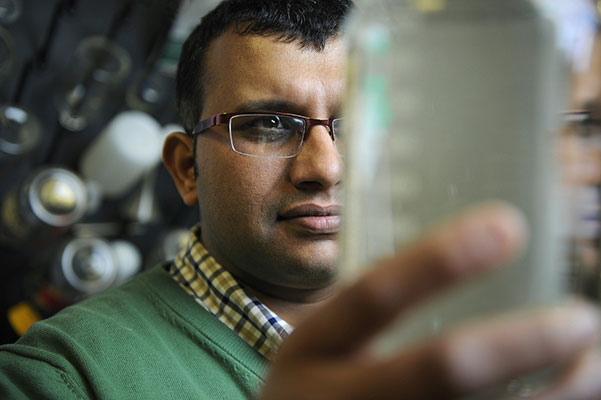Ameet Pinto Awarded WRF Grant for Rapid Detection of Microbials in Water Utilities

CEE Assistant Professor Ameet Pinto was awarded a Water Research Foundation grant for his proposal titled “Rapid Detection and Quantitation of Active Microorganisms.” The award will confer $522K in funding for Pinto’s team. The Water Research Foundation is one of the world’s leading non-profit organizations funding critical research into water utilities. Pinto is joined on the award by co-PIs Christopher Anderson, also from Northeastern University, Dr. Raul Gonzalez of the Hampton Roads Sanitation District, Dr. Andrea Busch of the Great Lakes Water Authority, and Dr. Wendell Khunjar of Hazen and Sawyer.
The community of microbes that thrive in all water, regardless of the sanitation process, can affect everything from the health of the drinker to the quality of the pipes and infrastructure through which the water travels and treated wastewater that is discharged into the environment. DNA sequencing of the water and wastewater can provide an in-depth understanding of what is in our water, but this approach offers a few constraints. It can take a long time to sequence and analyze DNA from water samples. Despite its cost-effectiveness, the lag time between sample and actionable data currently makes DNA sequencing a poor tool for engineers looking to make real-time decisions. Additionally, results can also leave unclear the question of how active or common a pathogen is in the water supply.
In his new grant, Pinto and his team will explore methods to improve sequencing and analysis times and quality. “Enabling rapid turnaround times on sample-to-data acquisition and analyses, and determining whether detected microorganisms are active would represent a breakthrough for the water industry,” their proposal states. The team will be developing an easy-to-use Nanopore sequencing protocol, which aims to deliver microbial species detection, quantitation, and replication rates estimation in as little as 1-2 hours. The new technology will be tested at the Great Lakes Water Authority in Detroit, MI and at facilities operated by the Hampton Roads Sanitation District.
According to Pinto, the use real-time analysis of DNA to guide decision making would be a breakthrough for the water industry, providing highly-detailed insights into the quality of water. “Our goal is to make real-time sequencing for real-time process control available, accessible, and affordable to the water industry such that large and small water utilities alike are able to include this as a routine component of their process monitoring and control efforts,” the team stated in their proposal.
Those interested in this area of study should consider our BS in Environmental Engineering, MS in Environmental Engineering, or our PhD programs.